![]()
Appalachian Autumn (2008) Tour
Part 2: Horseshoe Curve, Altoona, Allegheny Portage Railroad
Observation: There are far fewer imported cars on the road here in Western Pennsylvania than we see at home. I'm guessing this is a direct result of several generations of local workers whose livelihood has historically depended upon the health of the domestic auto industry.
A sub-observation: I've also noted an almost complete absence of the Toyota Prius that is so ubiquitous on the West Coast.
 |
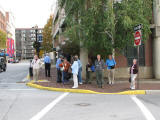 |
 |
 |
| Mo grabbed a (Starbucks) latte before we headed out on a short Amtrak trip from Pittsburgh to Altoona, via the famous Horseshoe Curve. We took this picture to show how roomy day coaches are - wouldn't it be nice to have that much room on a plane? Our train trip through the Horseshoe Curve was a little different than expected - more about that later. Nice, smooth rail on this section of track - most of it triple-tracked. | When we arrived at the Altoona station, our bus was nowhere to be found. So here we are, looking distinctly like lost tourists. A local "Altoonian" gave us walking directions to our next stop (a museum), and we headed out on foot. The bus eventually showed up. | This is the Altoona Railroader's Museum. The outdoor collection is a bit worse for wear, but the indoor exhibits (in the large brick building behind the turntable) were some of the best we've seen. The turntable is remarkably large. The museum sits on an area previously occupied by the Pennsylvania Railroad's extensive Altoona shops. | I always enjoy bits of history that highlight changes in the way the genders have been treated. Here's a great description of one of the (rare) railroad roles filled by women. |
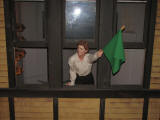 |
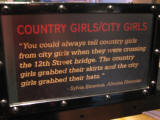 |
 |
 |
| Flagging a train from the tower. | The picture's a bit fuzzy (handheld natural light), but a fun observation nevertheless. | The Pennsylvania Railroad's overnight train from Chicago to New York was known as the Broadway Limited. I had assumed the name came from New York's Broadway. Most rail historians say the name actually originates from the quadruple-tracked mainline that were present on many sections of this heavily traveled route. Today, it is mostly triple track - but still very heavily used for freight traffic. | The Railway Express Agency - how shippers got packages across country before the days of FedEx and UPS. I remember going with Dad down to the REA office in Seattle to pickup a shipment from Allied Radio in Chicago (It was a shortwave radio kit I was going to build). I had braces and (black frame) glasses at the time. After looking me over, the "customer service" person waiting on us said "My, you're defective aren't you?". Funny I remember that very clearly after 40 some years. |
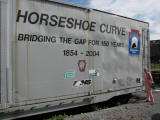 |
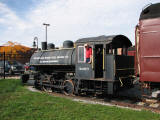 |
 |
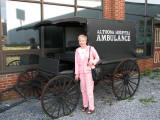 |
| Just a few miles from Altoona is the famous Horseshoe Curve, celebrated on this boxcar lettering. | This picture is for Betsy, and she will know why. | ||
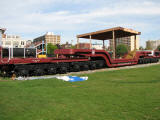 |
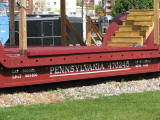 |
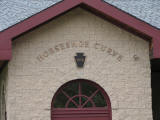 |
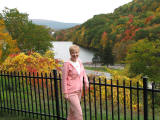 |
| This is without a doubt the biggest "Low Boy" I've seen. Sixteen axles.... | ....and a capacity of half a million pounds (250 tons)! | After exploring the museum in Altoona, we took a short ride to the Horseshoe Curve. The entire grade here was constructed before power machinery was available. The manual labor was done using hand tools and black powder, largely by Irish miners brought over for the task. | The fall colors are showing spectacularly. |
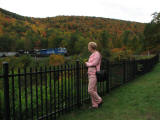 |
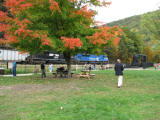 |
 |
 |
| In our 45 minutes or so at the viewpoint, we saw four trains pass. | This is a terrific spot for train viewing, since you can follow the train coming... | ...and going. | Look carefully at this picture and you can see that there are two trains coming through the curve. Bright blue Conrail locomotives can be seen on the far track heading to the left. I noted earlier that our Amtrak trip through the Curve was different than expected. As our Amtrak train rolled through on the far rail, a freight passed us on the near rail - more or less completely obliterating our view of the curve from the train. |
 |
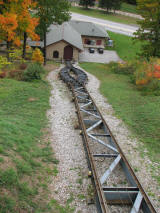 |
 |
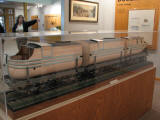 |
| Another train heading through the curve from the fine viewing area. | There's a funicular railroad that runs up to the viewpoint. Unlike the inclines we saw yesterday which have two tracks for the full length, this one uses a single track with a "passing track" in the middle for the two cars to pass. Unfortunately, it was out of service today so we hoofed it up the stairs. | A few miles from the Horseshoe Curve, we enjoyed a very pleasant walk through the Alleghany Portage Railroad historic site. | For about twenty years before the Horseshoe Curve was completed in 1851, cargo destined for Western Pennsylvania was carried on barges to the Eastern slopes of the Alleghenies, where the entire barge was loaded onto a railcar and hoisted up the mountains. This is almost certainly the first example of containerized cargo! |
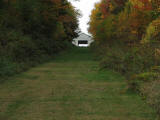 |
 |
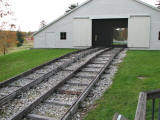 |
 |
| You can still see the clearly-defined grade where the barges were lifted up the mountain on railcars. | The original rails on timber. | A stationary steam engine at the top of the grade provided the lifting power. | I was surprised to find that the lift pulleys were essentially driven directly from the steam engine. I expected there might be some gear reduction used to increase power and reduce speed. |
 |
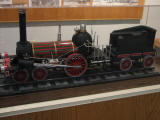 |
 |
 |
| The barges on railcars were initially hoisted by conventional manila or hemp ropes....which sometimes broke with disastrous results as the cars (which had no brakes) careened back down the grade. This clever "brake car" was eventually added to the mix. If the tow rope broke, the railcar would slide downhill back onto the brake car, which had an ingenious design that pressed a wooden wedge against the rails to slow the runaway car. Eventually, the fiber ropes gave way to Roebling's wire rope, but time was running out for the Portage Railroad - once the Horseshoe Curve was completed, the all-rail route between Philadelphia and Pittsburgh made the Portage obsolete. | To haul the barge-on-railcar trains on level grades, a very early steam engine (4-2-0) was used. | It's always a challenge to capture photos of fall color - especially out a bus window. This gives you an idea of the colors that are developing as we head further East and up in elevation. | We spent Monday night in Johnstown, where we found this interesting church sign. |
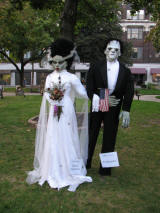 |
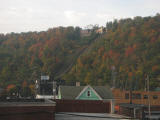 |
Click here to watch a short movie taken at the Horseshoe Curve | |
| Autumn displays are very common here. We also saw these outdoor displays when we were in Kentucky several years ago. In a downtown Johnstown park, local businesses competed on fall displays. This one was a combined entry from the local tux shop and bridal shop. | Tomorrow, we will head up the Johnstown Inclined Plane (shown here from the window of our Amtrak train as we headed to Altoona this morning). The cars on this inclined railroad are big enough to transport automobiles up the hill. | (Video files are very large, and will take several minutes to download even with a fast internet connection.) |